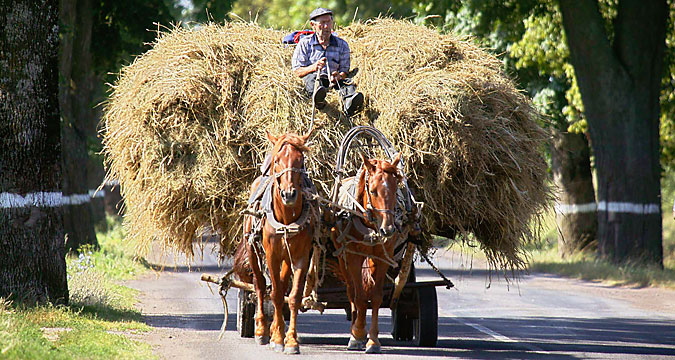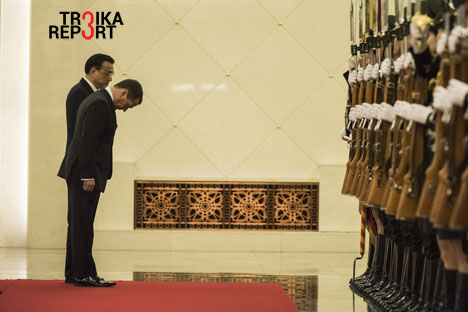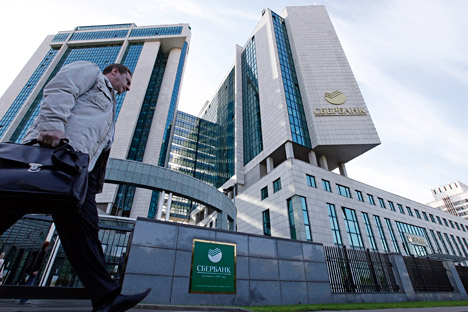Press Digest: Data disproves Medvedev’s claims on Russia’s food industry

Russian farmer in Kaliningrad.
Igor Zarembo/TASSRussian farmers neither damaged nor helped by embargo
The Vedomosti business daily cites Russian Prime Minister Dmitry Medvedev as saying that the Moscow-initiated embargo that closed the Russian market to vegetables, meat, fish and dairy products from the EU, the U.S., Canada and Australia "was very beneficial to Russia's agro-industrial complex." The Russian market "had practically not noticed" the lack of imported products, said Medvedev.
But the newspaper provides data provided by the Accounting Chamber, which analyzed the state's support of the agriculture sector in the January-October 2015 period: Russian producers replaced from 70 percent (meat) to 15 percent (dairy products) of the banned imports. And, despite Medvedev's call not to permit a deficit and a price hike, the index of retail prices on food products from January to November 2015 increased by 21.4 percent.
Russians becoming more tolerant of migrants
The Kommersant business daily reports that, according to surveys, Russians are less aggravated by migrants than several years ago. But the xenophobia has been directed towards other objects: They are now more interested in hating Ukraine, the U.S. and the EU.
This year Russians followed a number of prominent migrant stories with interest. The tragic death of a five-month-old Tajik boy drew much sympathy and indignation. Attention was also raised by the story of Syrian refugees who spent more than two months in the transit zone of Moscow’s Sheremetevo airport.

Russia streamlines its ‘pivot to Asia’
The Levada Center survey on xenophobic and nationalistic attitudes in Russia in 2015 shows a gradual reduction in negative views toward migrants, with the results proving that the level of xenophobia has significantly decreased, especially since 2013.
In October 2013, 54 percent of the respondents said that they favored the restriction of residency in Russia for Caucasus natives. Now the figure is 29 percent. In 2015 there has also been an increase in tolerance for natives of Central Asia. The number of those in favor of legalizing them is now equal to the number of those who think Central Asian nationals should be deported (40 percent). In 2013 the percentage of those who thought that these migrants should be expelled was 70.
Levada Center sociologists believe that Russia's xenophobia has entered a dormant phase and citizens have only redirected their aggravation towards the confrontation with the West and the situation in Ukraine: in 2015 the level of Russians' negative attitude towards the U.S. exceeded 80 percent, towards the EU – 70 percent, and towards Ukraine – 60 percent.
FSB identifies hundreds of militants who have returned from Syria and Iraq
The RBK business daily reports that the Russian Interior Ministry in collaboration with the country’s security service, the FSB, is following the movements of more than 2,800 Russians who had left the country to fight with the Islamists in Syria and Iraq. A total of 889 of those who returned have already been named in criminal cases. Moreover, the special services have identified 92 recruiters working for banned foreign armed groups.
In the fall the Interior Ministry's regional branches were ordered to conduct additional operative-search and preventive measures in relation to Russia's participation in the military campaign against Islamic State (ISIS), which is banned in the country. Due to the tense international situation the Interior Ministry has strengthened its fight against the penetration of international extremist and terrorist organizations in Russia.
Among those who wish to fight on the side of the Islamists is a substantial number of people from regions that have predominantly non-Muslim populations.
"Religion has nothing to do with it, the main thing is a feeling of protest, a lack of interest in the ways of self-realization that society offers. Before youths who had these problems adhered to nationalist movements, today other currents are in vogue," said a law-enforcement agent.
He added that for Russians now the route to the ranks of the Islamists is almost entirely blocked. Recently it has become very difficult for potential militants to leave Russia and travel to Syria.
The world in 2015: A nostalgia for balance>>>
All rights reserved by Rossiyskaya Gazeta.
Subscribe
to our newsletter!
Get the week's best stories straight to your inbox
